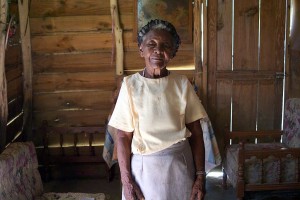It was 5 years ago, about halfway through our six-month stint serving in the Dominican Republic. We had a team of American volunteers running a Bible day camp, campamento de biblia, in la Cruz, a small, impoverished village about an hour outside of town.
Tom, who was the director of the program, was with us that day and invited me to go for a walk with him through the village. As was frequently the case, many people greeted us as we walked. One woman invited us into her home.
 The front room was a cross between a shed and your grandmother’s sitting room. The furniture was nice, with Victorian print upholstery, but the floor was dirt and daylight streamed in between the rough boards that made up the walls.
The front room was a cross between a shed and your grandmother’s sitting room. The furniture was nice, with Victorian print upholstery, but the floor was dirt and daylight streamed in between the rough boards that made up the walls.
She told us her story: how she had taken in the neighbors’ 11-year-old daughter when her mother and father had both been killed in a motorcycle accident.
She told us how, while the girl was at school each day, she would go out and find whatever jobs she could, in order to buy enough food for them to have supper.
Life in la Cruz was difficult for everyone. But especially for this elderly widow and the orphan she had welcomed into her home.
There was a pause in the conversation and my eyes drifted to the ceiling, to a single light bulb, screwed in to a simple porcelain fixture. Tom, always looking to serve, asked her, “Is there anything you need?”
It was a stupid question, she needed so much. But her answer surprised me. “It would be nice to have a candle,” she said. And then she explained how, many months before the power had gone out in la Cruz and never came back on.
Power in most of these villages was spotty, but we hadn’t heard of this before. The bulb, the fixture, the wiring… it was all there. But somewhere down the road it lacked the vital connection to a source of power. And in this simple home in the village of la Cruz, when the sun went down, it was dark.
The true vine.
In John 15:1-8, we see the significance for the believer of this same vital connection to Jesus Christ. We see how Jesus’ identification as the true vine illustrates his life-giving nature as source and support for those who would remain in Him.
Prior to chapter 15, Jesus has been gathered with his disciples in the upper room. In Chapter 12, He predicted his own impending death. In Chapter 13, He washed the disciples’ feet, and then predicts Judas’ betrayal and Peter’s denial.
Jesus is preparing to physically leave this world, and—speaking to his disciples—he wants to prepare them for his departure.
So when Jesus begins speaking in John 15:1, he may have stopped in a vineyard along the road. He may have picked a handful of ripe grapes, and he turns to his disciples and he says, “I am the true vine.”
He is not making a comparison. He is identifying personally with the nature of the vine.
For the grape, the vine is not what bears the fruit. The vine is, rather, like the trunk of a tree: the structure, and source, the life-giving conduit that sustains the branches. But it is the branches that bear fruit. It is the vine working through them.
Remember, for several years, Jesus had been among his disciples physically. He had been performing miracles, he had been healing, he had been casting out demons; he was the leader; he was the rabbi; he was the teacher.
And now he’s preparing his disciples for his departure. No longer, he says, will I be the one bearing the fruit. You’ve kind of gotten used to this system, where we walk around and I do stuff and you watch and learn. But it’s going to change tonight. Instead, I’m taking a different nature, a different role.
In John 14:12, He had said, “Anyone who has faith in me will do what I have been doing. He will do even greater things because I am going to the Father.”
He says, instead of me bearing fruit, you will. I’m taking a new nature: the nature of the vine. I will support you. I will nourish you. I will provide for you. I will protect you. I will lift you up, and you will be the ones who will bear the fruit.
This is the first in a three-part series. The next two posts will address The Nature of the Gardener and What it Means to Remain in Him.